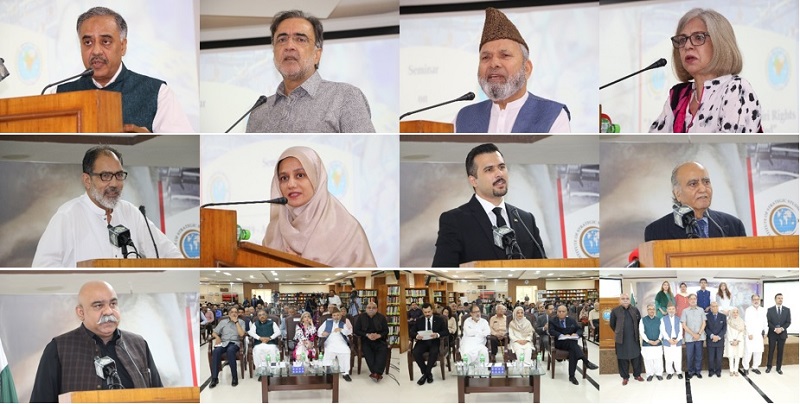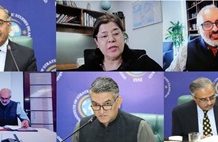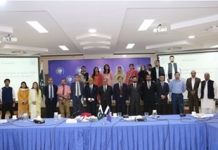Press Release
Pakistan’s abiding commitment to Kashmir cause reaffirmed at ISSI Seminar

Pakistan’s strong solidarity with the Kashmiri people and abiding commitment to the just cause of Kashmir was reaffirmed at a Seminar organized by the India Study Center (ISC) at the Institute of Strategic Studies Islamabad (ISSI), in connection with Youm-e-Istehsal (5 August). The speakers highlighted the historical, legal, human rights, and strategic aspects of the Jammu and Kashmir dispute.
The Seminar, titled “August 5, 2019 – Assault on Kashmiri Rights and Identity Continues Unabated”, was attended by a large number of diplomats, academics, researchers, students, members of the civil society, and representatives of the media. The distinguished speakers included: Member, Independent Permanent Human Rights Commission (IPHRC) of the OIC, Ambassador Tasnim Aslam; former Minister for Social Welfare and Women Development, Azad Jammu and Kashmir (AJK) Ms. Farzana Yaqoob; Executive Director, Research Society of International Law (RSIL), Mr. Jamal Aziz; Chairman, Kashmir Institute of International Relations (KIIR), Mr. Altaf Hussain Wani; and Convener, Tehreek Hurriyet Jammu, and Kashmir, Mr. Ghulam Muhamad Safi, were the distinguished speakers of the occasion.
Advisor to the Prime Minister on Kashmir Affairs and Gilgit Baltistan, Mr. Qamar Zaman Kaira, was the chief guest.
In his introductory remarks, Acting Director ISC Malik Qasim Mustafa, highlighted that since 1947, when India illegally occupied the State of Jammu and Kashmir, India’s atrocities and denial of justice to the Kashmiri people were continuing unabated. The 5th August 2019 assault by India on Kashmiri rights and identity and inhumane military siege and brutality of Indian security forces had further accentuated the sufferings of the Kashmiri people. Underscoring the importance of relevant UN Security Council resolutions, he stressed that the international community had a responsibility to facilitate peaceful solution of the Jammu and Kashmir dispute.
In his remarks, DG ISSI Ambassador Sohail Mahmood stated that 5th August – another ‘Black Day’ in history – marked the completion of 4 years since India’s illegal and unilateral actions aimed at changing the internationally recognized “disputed” status of Jammu and Kashmir and altering the demographic structure of the occupied territory. He noted that, in the run-up to India’s illegal actions of 5th August 2019, additional troops deployments were made by India in IIOJK, which was already the “most militarized zone” in the world. Moreover, a round-the-clock curfew was clamped; total communication blockade was effected; and the entire area turned into an ‘open jail.’ The level of oppression was hugely upscaled by the Indian security forces – indiscriminately targeting Kashmiri men, women, and children. Arbitrary arrests, custodial torture, extra-judicial killings, and cordon-and-search operations followed. With the advent of Covit-19 pandemic, Kashmiri were subjected to “double lock-down.” Meanwhile, India relentlessly pursued its sinister design of demographic change and turn the Kashmiri Muslim majority into a minority in its own land.
DG ISSI Sohail Mahmood also highlighted the crackdown against the media and human rights defenders; the complete impunity enjoyed by Indian security forces under draconian laws; India’s attempts to peddle a fiction of ‘calm’ and ‘normalcy’ in IIOJK; and New Delhi’s desperate efforts to elicit legitimacy for its illegal occupation through convening of some G20 meetings/events. He added that what was happening in IIOJK was also part of the RSS-BJP ‘Hindutva’ project, which espoused the goals of ‘Hindu Rashtra’ and ‘Akhand Bharat’ and was thus fraught with grave implications for peace and security in South Asia. In this phase, with next Lok Sabha elections due in 2024, it was important for Pakistan to maintain enhanced vigilance as ‘false flag’ operations or another military misadventure by the BJP government could not be ruled out. He concluded by stressing that the international community, including the UN Security Council, must shoulder their responsibility in facilitating a peaceful resolution, as justice for Kashmiris would mean sustainable peace for South Asia and its nearly 2 billion people.
In his address on the occasion, Chief Guest Qamar Zaman Kaira highlighted Pakistan’s steadfast commitment to the Kashmir cause, as reflected in its stance that Kashmir is the ‘unfinished agenda of the partition.’ He added that all political parties in Pakistan had a similar position on the Kashmir dispute, as all were committed to its peaceful resolution through implementation of UN Security Council resolutions. The Adviser added that Jammu and Kashmir dispute was the core issue between India and Pakistan and its just solution would strengthen regional peace and stability. He also stressed the need for educating the younger generation on the history and legality of the Kashmir dispute so that they could, in their own turn, also fight this case with vigour and conviction. Lauding the ISSI’s initiative of holding the Seminar, the Adviser stressed that the Kashmir cause had to be advanced also through thorough research work and intellectual endeavours. This was essential for preventing any distortions and dilution of positions. Underlining that a strong Pakistan would always be a strong advocate of Kashmir, the Adviser pledged that the government would continue to promote the cause through vigorous efforts and proactive diplomacy.
Of the other speakers, Ambassador Tasnim Aslam talked about the history of the Jammu and Kashmir dispute and emphasized the need for implementation of the UNSC resolutions, calling for a fair and impartial plebiscite to enable the Kashmiris to determine their own future. She also analyzed the dynamics in the Security Council, the OIC’s steadfast support on Kashmir, and the impact of geo-strategic factors on issues such as Kashmir and Palestine. Ambassador Tasnim Aslam also highlighted the need for proactive use of social media platforms to raise global awareness about Kashmir and enable people across the world to force their governments to change their stance in favour of Kashmiris’ rights.
Ms. Farzana Yaqoob highlighted the trials and tribulations endured by the Kashmiris in their epic struggle and underlined that the Kashmir cause can never be compromised through Indian lures of investment and development. She appreciated Pakistan’s consistent support for the Kashmir cause and underscored the importance of all segments of society, and particularly the youth, playing their part in its further advancement. She particularly stressed the importance of highlighting India’s atrocities and ‘war crimes’ to the world community, while the Kashmiris pursued their struggle with patience, perseverance and equanimity.
Mr. Jamal Aziz stressed the need for a more proactive and robust strategy on Kashmir, based on International Law. He stated that India was fighting on a wrong footing and, through International Law, Pakistan – as an ardent advocate of the Kashmir cause – could press the case about illegality of India’s occupation and Indian actions of 5th August as the sovereign title of Kashmir had never transferred to India.
Mr. Altaf Hussian Wani, while presenting his perspective on the way forward, underlined the need to make Azad Kashmir the hub of knowledge and academic engagement regarding Kashmir, in the region and international arena as well. He called for having a ‘Charter of Kashmir’ adopted by all political parties and proposed that it should also be included in their respective manifestos.
Mr. Muhammad Ghulam Safi said that the brutalities that India was committing in Kashmir knew no bounds. Ban on religious activities, restrictions on all forms of speeches, gagging the public opinion and journalism, legalizing brutality by empowering law and order agencies through draconian laws, and making life hell in the ‘heaven on earth’ – Kashmir – were all illustrative of Indian oppression. He also highlighted the sacrifices rendered by Syed Ali Shah Geelani and Ashraf Sehrai as well as a large number of Kashmiri leaders imprisoned in Tihar Jail including Yasin Malik. He concluded by stressing that, despite enormous odds and unabated Indian repression, Kashmiris will continue their struggle until they achieved their inalienable right to self-determination.
Chairman BoG ISSI, Ambassador Khalid Mahmood, in his concluding remarks, said that India’s illegal steps of 5th August had, on the one hand, caused a nose-dive in Pakistan-India relations and also impacted India-China relations. On the other hand, they had served to reinvigorate the Kashmiri struggle. He noted that there had been many positive developments as well including the 3 sessions on the subject in UNSC after 5th August 2019, the 2 Kashmir reports issued by UN High Commissioner for Human Rights, affirmation of relevant Security Council resolutions by the UN Secretary General, and the steadfast support extended by OIC. He added that this Seminar had highlighted myriad dimensions of the Jammu and Kashmir dispute and thus made a contribution to raising international awareness and better understanding.











